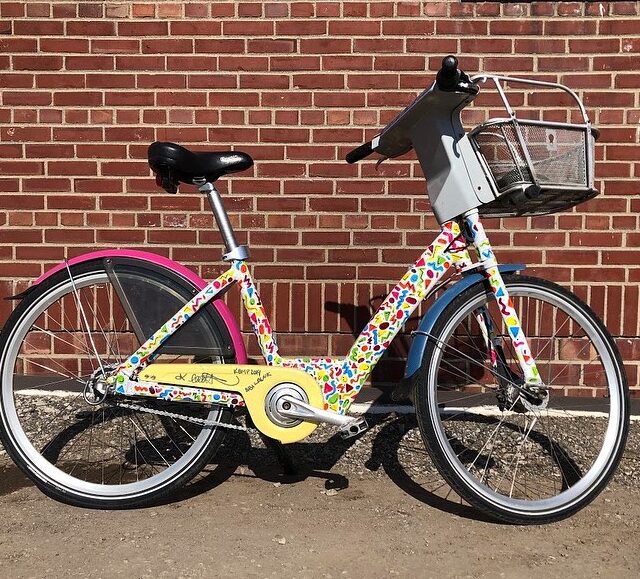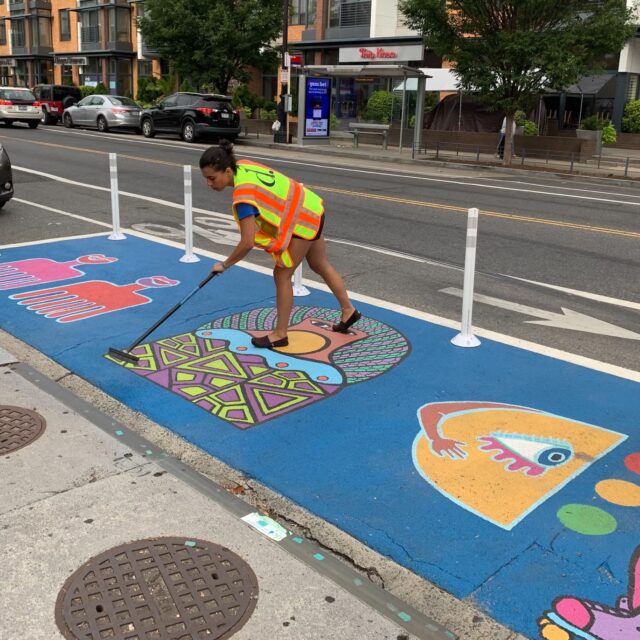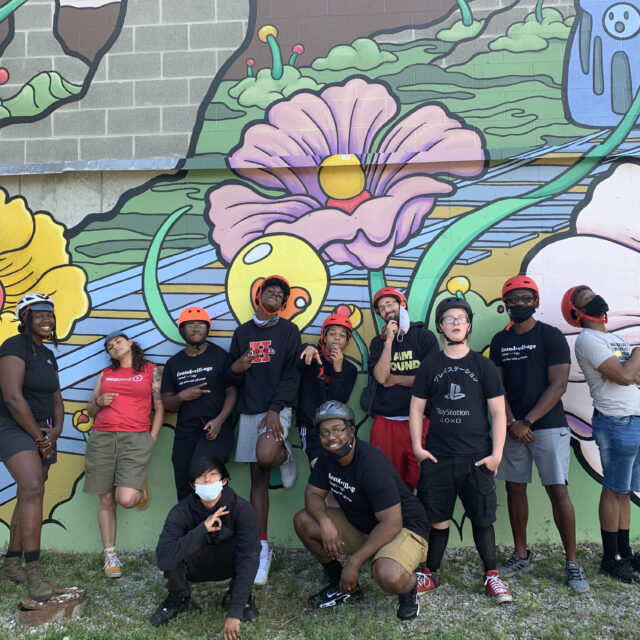Bikes, Barbershops & Station Art
by Kiran Herbert, Communications Manager
November 3, 2021
In Columbus, Ohio, CoGo bike share takes a multifaceted approach to community engagement.
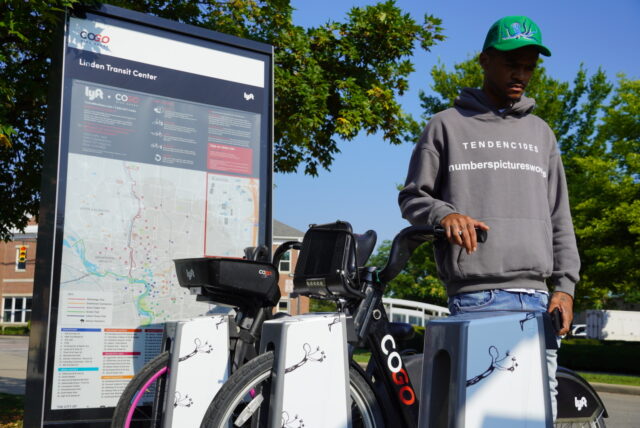
Kamar Kent is one of CoGo’s three station design contest winners.
The Linden neighborhood, in Columbus, Ohio, is like many communities with limited transportation options. Not only is the median household income significantly lower than the city’s as a whole, but the neighborhood also lacks recreational amenities, major employers, and essential services like healthcare, grocery stores, and banks. Although relatively close to Columbus’ downtown core, the construction of Interstate 71 along Linden’s western border has left the area cut off and made commuting difficult, especially for carless households. And despite a MAX bus rapid transit line along its main corridor, first and last-mile connectivity remains a challenge.
Recognizing the role shared micromobility could play in helping to alleviate some of these issues, CoGo, Columbus’ bike share system, expanded to Linden in 2020. In anticipation of that expansion, the operator was awarded a BBSP mini-grant in February 2020 to launch a bike share station design contest, host a mobility block party, and do additional community outreach.
“Linden has been engaged to death—it’s the go-to “vulnerable” community in Columbus and I think the residents there feel a little fatigue around that,” says Scott Ulrich, Healthy Places and bicycle director at Columbus Public Health, a partner of CoGo. “So we really needed to start with building trust and building a relationship there instead of just being like, we’re here and you should ride bikes.”
From the outset, the goal was to capitalize on multiple concurrent efforts to improve access and mobility in the Linden neighborhood—much of it tied to Columbus’ $50 million Smart Cities grant—elevating bike share in all of those efforts and the role it can play in uplifting people’s lives. With Ulrich’s department focused on the city’s COVID-19 response, however, Lyft, CoGo’s operator, took the lead on executing the grant’s various engagement strategies.
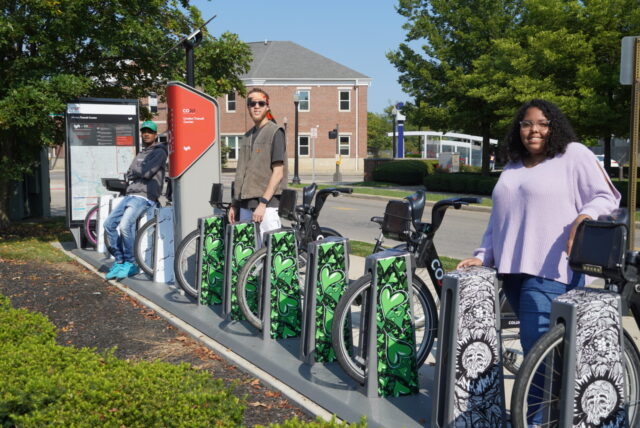
Kamar Kent, Bryant Anthony, and Tiana Ferguson Nieves stand next to their winning station designs.
Station Design Content
As a way to engage local artists and create awareness around its three new Linden bike share stations, CoGo launched a station design contest. Artists were recruited through social media posts and sharing information with local art-based organizations, after-school programs, and recreational centers. A partnership with St. Stephen’s Community House, a trusted local nonprofit, also helped spread the word about the contest, which offered three $500 gift cards.
The three winners were Tiana Ferguson Nieves, a youth inspired by the work of Vincent Van Gogh, Bryant Anthony, who paid homage to the Pan-African flag designed by Marcus Garvey in 1920, and Kamar Kent, whose design represents the old saying of giving someone their flowers while they can smell them.
“Through my art, this is me giving flowers to my community for raising me and all the people who call it home,” says Kent. “My connection to Linden is simple, I was born here, I went to school here and nearly everyone I know including me still lives here, it is all we know.”
All three designs were wrapped and unveiled this year, and while undoubtedly a success, Lyft Marketing Manager Tom Rousculp has some recommendations for other bike share systems interested in tapping local artists for right-of-way designs.
“These types of engagements can be very challenging but we ended up with three great artists this time,” says Rousculp. “If we had it to do again we would spend more time on the leg work upfront and commission local artists and designers with ties to the community to do the work. That keeps the timeline, communications, costs and final work aligned to deliver a better all-around program.”
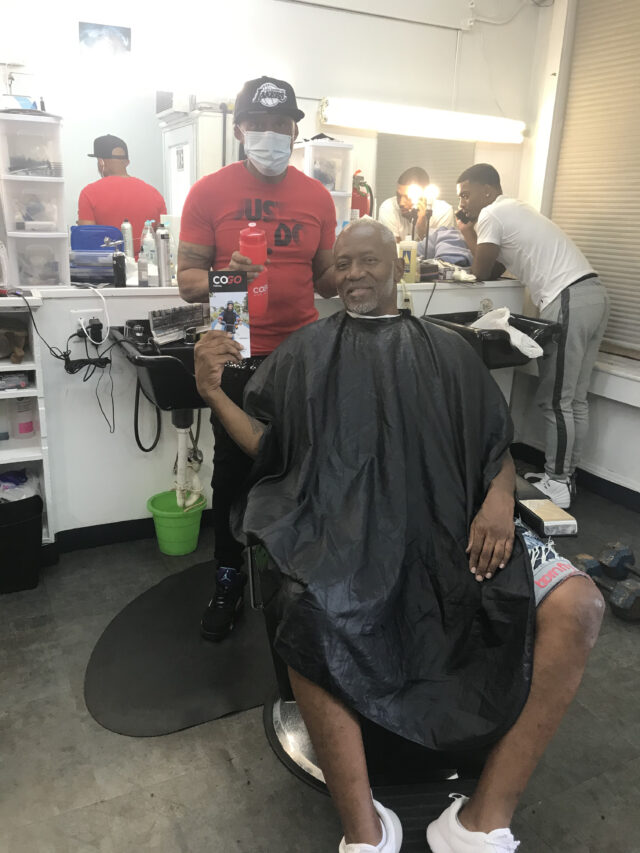
CoGo held two activations in Linden barbershops.
Bikes & Barbershops
For this campaign, CoGo partnered with youth bicycling organization Remember Us Urban Scouts to stage pop-ups at two Linden area barbershops—MC’s House of Styles and Dreamers—to gauge residents’ interest in learning about CoGo and their comfort level in speaking about bicycling in general. CoGo day passes were distributed to customers as part of a special promotion, hoping to create ambassadors in the process.
This idea for the barbershop activations came from Carl Nathan Lee I, the South Linden liaison for Columbus’ Smart Cities work. Lee was brought in to brainstorm project ideas and identified barbershops as the place where people congregate in Linden. In particular, he noted that that’s where you’d find neighborhood “influencers,” or trusted community voices that others would listen to.
CoGo gained valuable feedback from the barbershop activations that they are working to implement, including preferred riding locations for station siting and making free day passes available to community members.
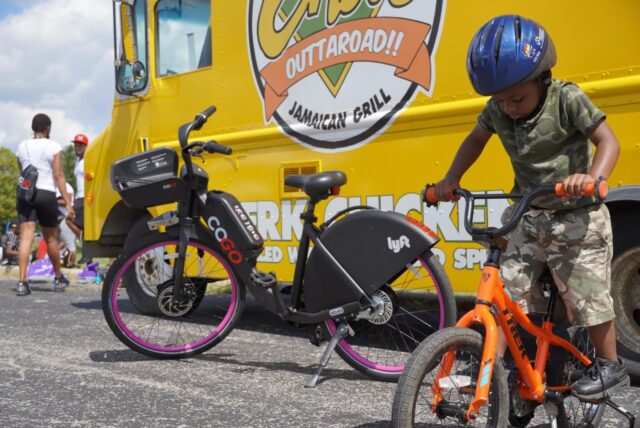
Sixty kids bikes were distributed during a CoGo Mobility Block Party.
Mobility Block Party & Kids Bike Drive
The CoGo team partnered with three local community-based organizations, Remember Us Urban Scouts, St. Stephen’s House, and Franklinton Cycle Works to throw the “Linden 614 Block Party.” The event, which focused on helping students get ready to return to school, provided families feeling the economic effects of the pandemic with free giveaways and community resources to help alleviate financial stress. The event was successful in giving away 60 kids’ bikes to Linden area youth, as well as in surveying event participants on their perspective of bike share.
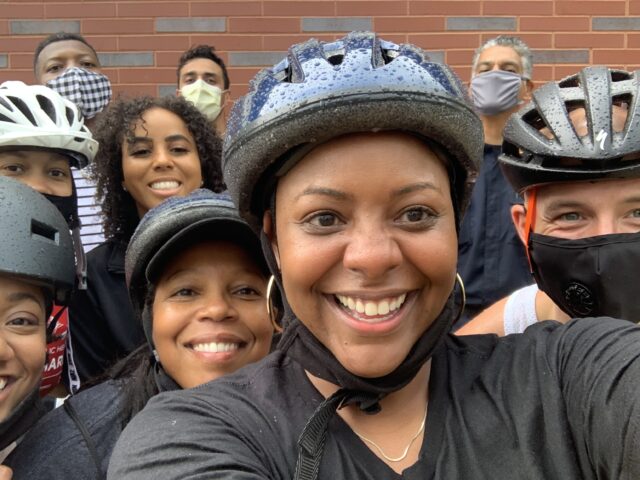
CoGo’s group rides were a resounding success and have continued to this day.
Demo Rides
The final component of CoGo’s mini-grant was an educational ride series geared towards teaching Linden residents how to use bike share, navigate useful neighborhood routes, and ride confidently and competently on-street. Toole Design was brought in as a contractor to assist with leading nine educational bike rides from a combination of the three Linden CoGo stations. All rides were capped at 10 participants and CoGo For All, the system’s low-income membership option, was promoted at each.
CoGo made e-bikes, traditional bikes, and helmets available free of charge and partnered with various community-based organizations to educate around relevant themes. For example, the “Linden Rides for Resilience” series was a collaborative effort between Remember Us Urban Scouts and the Columbus CARE Coalition, which works on violence reduction efforts. Each all-ages-and-abilities ride featured a community discussion component around trauma and resilience, important topics for people living in a community with a lot of violence.
To date, the demonstration rides have continued, as have many of the community partnerships cultivated as a result of this grant. While much of CoGo’s outreach highlighted inadequate infrastructure in the neighborhood, the team is hopeful that as critical improvements are made to enhance Linden’s bike network, a culture of bicycling will continue to grow.
“We’ve continued to use our relationship with Remember Us Urban Scouts to connect with residents, particularly youth, around group rides,” says Ulrich. “It definitely sparked something that we hope will continue to grow in terms of building a community around bikes.”
The Better Bike Share Partnership is funded by The JPB Foundation as a collaboration between the City of Philadelphia, the National Association of City Transportation Officials (NACTO) and the PeopleForBikes Foundation to build equitable and replicable bike share systems. Follow us on Facebook, Twitter and Instagram or sign up for our weekly newsletter. Got a question or a story idea? Email kiran@peopleforbikes.org.

